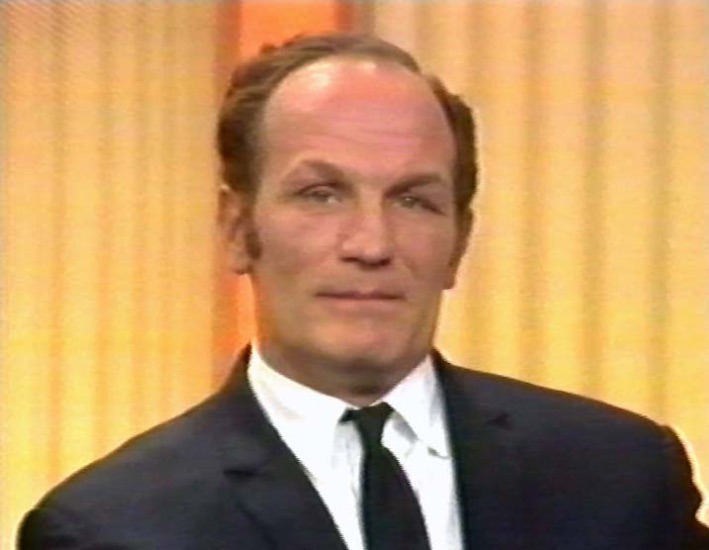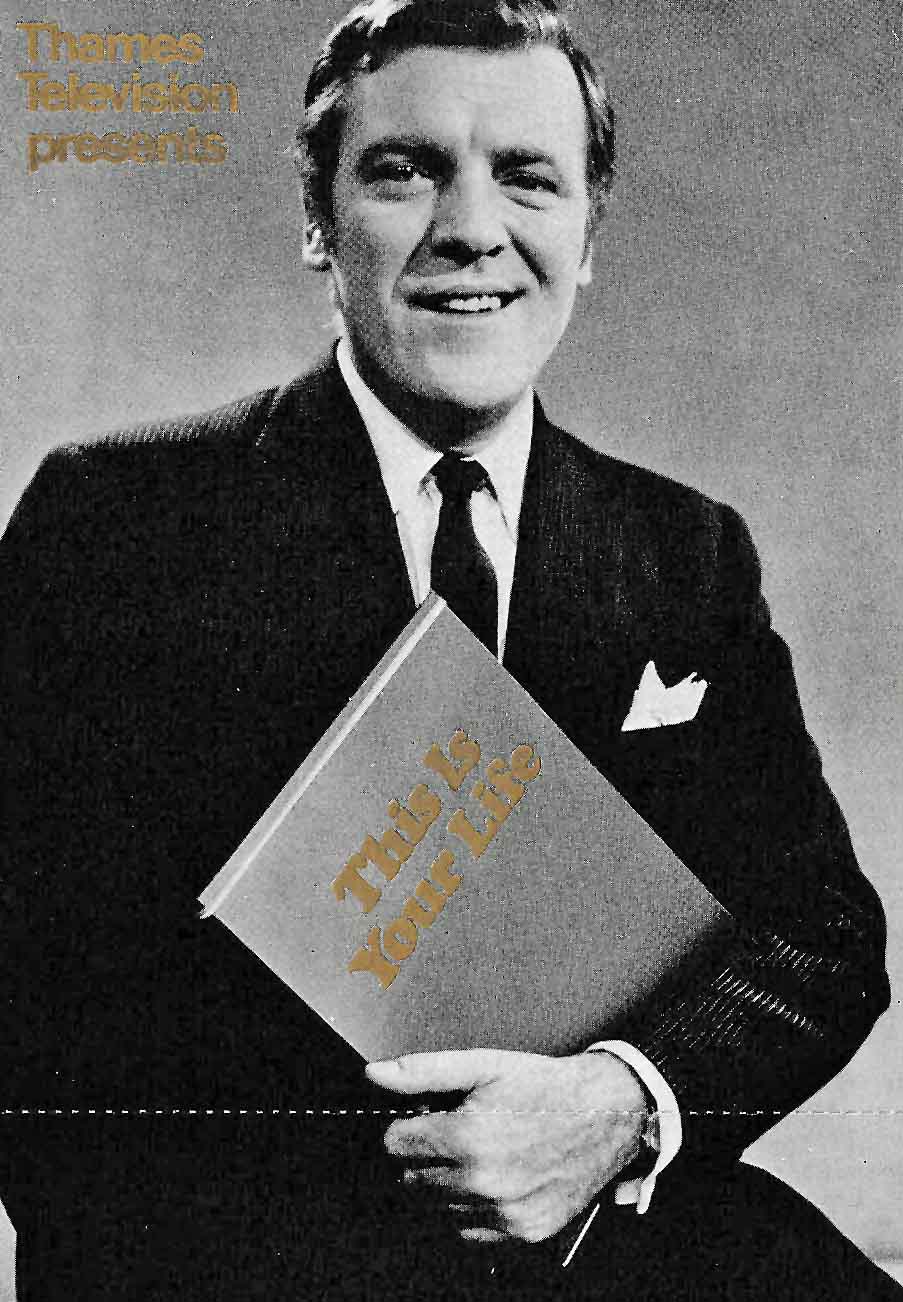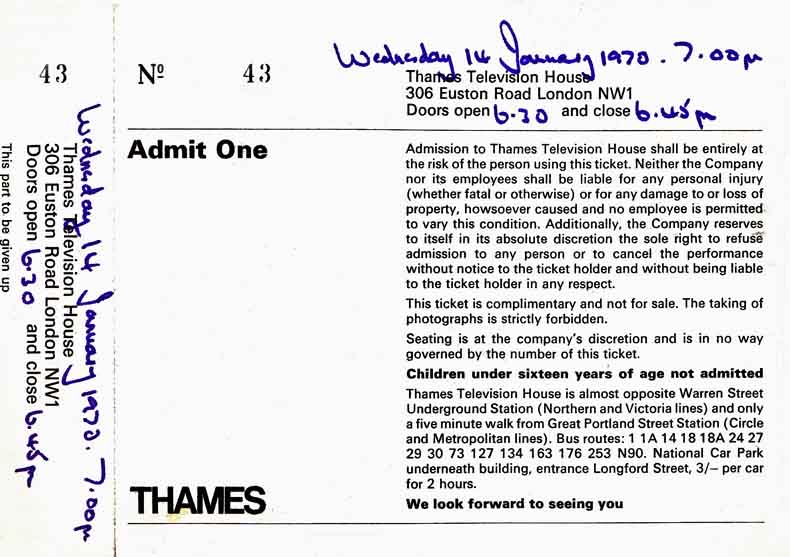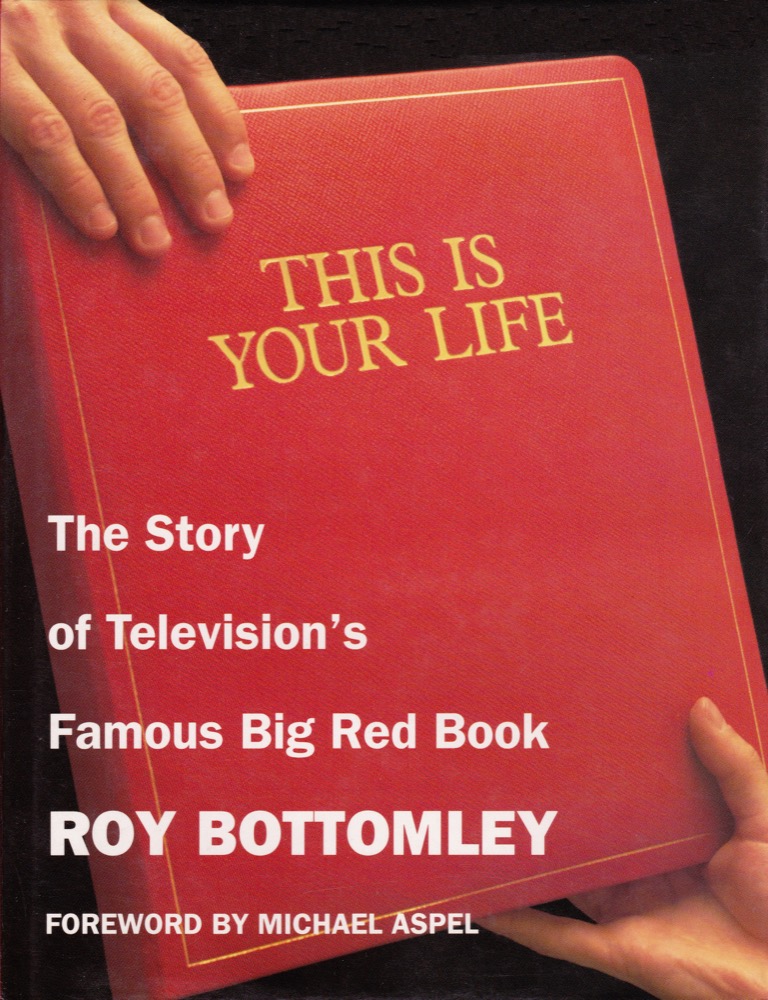Big Red Book
Celebrating television's This Is Your Life
Henry COOPER OBE (1934-2011)

THIS IS YOUR LIFE - Henry Cooper, boxer, was surprised by Eamonn Andrews at Thames Television's Euston Road Studios, having been led to believe he was there to be interviewed for another programme.
Henry, who was born in Lambeth, south London, began his boxing career in 1949 as an amateur at the Bellingham Boxing Club and, by the age of 17, had become the youngest boxer to win the Amateur Boxing Association light-heavyweight title. Following his National Service in the Royal Army Ordnance Corps, he represented Britain in the 1952 Olympics before turning professional with his twin brother, George, under the management of Jim Wicks.
Henry won the British and Commonwealth heavyweight championship in 1959 and would remain undefeated for longer than anyone else before. In 1964 he won the European heavyweight title, which he held for three years, and in 1966 he challenged Muhammad Ali for the World heavyweight championship but lost with an eye injury.
programme details...
- Edition No: 264
- Subject No: 266
- Broadcast live: Wed 14 Jan 1970
- Broadcast time: 7.00-7.30pm
- Venue: Euston Road Studios
- Series: 10
- Edition: 8
on the guest list...
- Harry - father
- Bernard - brother
- George - twin brother
- Albina - wife
- Bob Hill
- Mick Cavanagh
- Jim Wicks
- Harry Painter
- Dick Richardson
- Billy Walker
- Jack Bodell
- Archie McAteer
- Muhammad Ali - live link Filmed tributes:
- Henry - son
- John - son
related appearances...
- Alan Rudkin - Mar 1972
- Nosher Powell - Apr 1972
- Bill Griffiths - Nov 1972
- David Nixon - Dec 1973
- John Conteh - Nov 1974
- Jim Wicks - Dec 1976
- Muhammad Ali - Dec 1978
- Alan Minter - Apr 1980
- Douglas Bader - Mar 1982
- Jimmy Tarbuck - Apr 1983
- Frank Carson - Feb 1985
- John Harris - Jan 1986
- Jack Berg - Jan 1987
- Norman Wisdom - Feb 1987
- Harry Carpenter - Mar 1991
- David Berglas - Dec 1991
- Reg Gutteridge - May 1994
- Bob Wilson - Nov 1998
- David Vine - Feb 2000
production team...
- Researcher: Alan Haire
- Writer: Liam Nolan
- Director: Margery Baker
- Producer: Robert Tyrrell
- names above in bold indicate subjects of This Is Your Life
from flyweight to heavyweight
the applause, laughter and tears
Producer Robert Tyrrell reveals some 'cloak and dagger' tactics














Screenshots of Henry Cooper This Is Your Life and a rare audience ticket from the show's recording

Of course by now I well realised that as a boxer I was past my prime, and that I had only a couple of good fights left in me. The game is always full of surprises though, and there were a few left for me. It was a pleasant one first. I enjoy being in the public eye and I can't understand people who seek publicity at one time, then try to shun it at others.
But even with that sort of attitude I was completely taken by surprise when, one night early in 1970, I suddenly had a shove in the back and there I was on Thames TV stage with Eamonn Andrews saying,
'Henry Cooper, this is your life.'
I say completely taken by surprise but I think I have to qualify that. For a couple of weeks I knew something was going on but I couldn't put my finger on it. I would be due to meet Jim Wicks as usual when he would ring up and say,
'Sorry, can't see you today, I've got to meet a feller.'
Well, I'd known Jim like a father for sixteen years and he would never talk like that normally.
He'd say, 'Well, I won't be able to meet you because I've got to see Johnny so-and-so.' When he said, 'a feller', it didn't sound right somehow. He was being evasive, and so was Albina.
About three days before it was screened, the phone rang, Albina answered it and talked away to someone very softly. When I came into the room she suddenly talked out loudly and quite differently. I tackled her about it.
'Look, what's all this about? It isn't This Is Your Life, is it? Has Eamonn Andrews been on to you?'
And she acted so well. She flew up in the air.
'It's nothing of the kind. Oh, you're so conceited. Look, I'll ring up ITV if you don't believe me.'
She actually went and started dialling before I stopped her.
'Sorry, darling,' I said. 'I've got the wrong end of the stick.' I told her Jim had been acting a bit peculiarly, and I thought something must be going on. But she really convinced me that I was imagining things, and I forgot all about it.
Then Jim rang to say that Liam Nolan, a sports broadcaster, wanted to do a recording on our views on all the British heavyweights. He was the front man, and he got on the phone and said,
'Henry, I want you to do this programme and can we meet in town?'
He had a car laid on to take us to the studio, and while we were travelling he was asking me questions about this boxer and that, and he was saying,
'Yes, we'll use that.'
He made notes and ran through various questions he would ask me, and I was quite convinced. In the morning Albina had told me she was going shopping. I saw she had a dress with her, and I said,
'What on earth are you taking that for?' She said, 'Oh, I've got to have it altered.'
And I still didn't tumble. They had secret signs. If someone from the programme happened to ring up Albina and I came in, they had it all worked out. They had code phrases so they would know I was there, and they would ring off. It was all done very cleverly.
Anyway, when we got to the studio they said,
'Come on, this way.'
But Jim Wicks wanted to know where the toilet was.
'It's back there,' they said. We were right at the door at this point. Jim stood back, the door opened and suddenly I'm shoved in the back and I'm through the door.
Then I saw Eamonn, and directly I did I said, 'Would you believe it – you crafty old so-and-so.' All this had been going on for two months, so I found out later, and I was suspicious only the once.
I'd met Eamonn many times before, of course. He first made his name over here as a boxing commentator, and I'd often spoken to him on radio and television. There was a programme on television once where they showed you a bunch of kids and a set of personalities, and you had to guess which child belonged to which parent. My eldest boy, Henry, was there, and so was Eamonn with his little daughter. My boy goes over to Eamonn's daughter and says, 'Don't you worry. Just relax!' He wasn't ten years old at the time.
All the family were there for This Is Your Life except Mum, who was going through a bad time. She'd had a slight stroke, she was a diabetic and on top of that she had flu. So thinking that the excitement would be too much for her she stayed at home and watched it on the box.
Of the family, Albina, Dad, Bern and George appeared, and the kids from our house at Wembley. Another marvellous surprise was Ali, speaking from Cleveland.
'Henry,' he said, 'You're not as dumb as you look. I've never been hit so hard in my life.' I think one of the reasons Ali started to become so much more popular in Britain was that he said the odd good thing about me.
It was nice to see all the old faces on the show. There was the man who first started me in boxing, Mr Hill. We never ever called him anything else except Mr Hill, and for the first time I knew him as Bob. He was seventy-six, and I hadn't seen him for over twenty years, but he seemed to look much the same as he did when we were kids.
Then came Mick Cavanagh, the sergeant-major I'd put on the seat of his pants when I was seventeen and he was thirty-four.
Then I met a few boxing mates – Jack Bodell, Billy Walker, Dick Richardson and the first guy I ever fought, Harry Painter. Poor old Harry. He'd lost more hair than me.
Then they brought on a younger amateur boxing kid Archie McAteer. He had written to us from Preston and we had invited him to stay at the training camp for a few days. He loved boxing, and he would train with us in the gym and join in the road work. He was a bit young, and I had to tell him he wasn't ready for such hard work. But he was a nice kid, and mad keen.


No one was more surprised than British Heavyweight Champion Henry Cooper when Eamonn feinted with the Big Red Book at the Euston Road Studios on 14 January 1970, during the first Thames series.
Henry's taxi pulled up and he walked into the foyer, expecting a sports programme about his career, especially his fights with Muhammad Ali.
Ali was on the satellite and ex-fighters such as Billy Walker and Jack Bodell, who knew what it was like to step into the ring with Henry in his prime, had their say before the bell. Even Ali had been saved by the bell once, when Henry Cooper knocked him to the canvas. But Henry has always maintained Ali was the greatest fighter of his era.
All who know him would maintain that Henry Cooper is the greatest gentleman fighter of his era.

But before his return battle, Henry had to endure another rather more pleasing ordeal after being trapped by Eamonn Andrews and his Big Red Book. As a This Is Your Life scriptwriter for fourteen years, I knew the lengths they had gone to in their bid to keep the secret from him. Henry later told me it was one of the best, yet most nerve-wrecking experiences of his life. 'Jim Wicks set me up good and proper and as Eamonn came into view, I said, "You old rascal," or words to that effect. You sit there dazed and bemused, wondering who the heck is going to come onto the set next. But it was a wonderful night and I just could not believe that Albina, Jim and George had kept the secret from me. What made it for me was when the boys, Henry Marco and John Pietro, came on. That really choked me up.'
Muhammad Ali sent a filmed message from the United States and among the studio guests were Henry's old opponents Billy Walker, Dick Richardson and the man who was going to be in the opposite corner for his next fight, Jack Bodell.

It was Eamonn's voice that captivated Henry Cooper.
'Eamonn had a great voice. I used to love listening to him on radio. In his commentaries he was able to paint pictures, making you feel that you were at the ringside alongside him. He managed to catch the bigtime boxing atmosphere and you knew he wanted you to be part of the occasion.'
Today, the former British heavyweight champion, who is best remembered for his exciting fights with Muhammad Ali, lives with his Italian-born wife Albina in a spacious semidetached house in Hendon. Although he is director of a number of business companies, he still finds time to attend fights and do radio work. Off the hallway of his house can be seen a large glass showcase of trophies which he won over nearly twenty years of boxing.
He first met Eamonn in the fifties when he was a guest on the BBC's Sports Report. They soon became friends. To Henry Cooper, Eamonn was a big, friendly man. 'I think you could say he was a handsome man and he always had this grand smile when he met you. There was no affectation about him. For a big man he was gentle, never aggressive, and I never imagined him as a boxer. I like to reminisce, and so did Eamonn. He used to tell me about the boxing club he attended when he was growing up in Dublin. Boxing was his first love and he had always a genuine interest in the sport. He used to say that he got into broadcasting through boxing. He was very proud of his connection with the sport.'
In his view the secret of Eamonn's success was that anything he attempted, he did it well. 'Eamonn was a thorough professional and talking to him on a radio or TV programme you realised he had done his homework. I remember in the early sixties he was delighted when I told him that Sports Report was proving a good omen for me. Like most boxers I'm a bit superstitious - I mean the way I put on my boots or what I wear - and soon it struck me that every time I went on Sports Report I won my fight. It became so common that I began to invite myself on the programme.'
Socially they were to meet at charity dinners and at boxing receptions. He found that Eamonn liked to recall the great fighters of the past and had their names at his fingertips. 'He once asked me who I considered were the five greatest boxers of their eras. I think I told him Jack Johnson, Jack Dempsey, Joe Louis, Rocky Marciano and Muhammad Ali. We agreed that Ali was probably the fastest heavyweight the world has seen. Eamonn admired Ali's skill and craftsmanship and, as a person, found him good company.'
Although Eamonn tended to be selective in his choice of sportsmen as potential This Is Your Life subjects, because some of them were unable to articulate on screen, he had no objection when Henry Cooper's name was suggested at the Life conference. The boxer had a good story to tell, was respected by the public and the boxing profession, and was a fluent talker.
Henry has happy memories of the programme: 'I was invited to the television studios for a boxing discussion but when I arrived by taxi I was confronted by Eamonn. At first I was naturally taken aback but after a short time I got this marvelous feeling of satisfaction when Eamonn handed me the red book. I counted it an honour as well as recognition of my achievements in boxing.' He was amused when he recalled the phone calls he had been receiving during the previous weeks. A voice would say 'wrong number' when he lifted the receiver. Although he considered it odd he hadn't suspected a thing. The most moving moment in the Life programme, he would say later, was when Eamonn introduced the man who had started him off in boxing.
'I had been brought up in South London during the war years. This man was in the fire service and gave us young chaps a love of boxing. Now he was in his eighties. I recognised him straight away. It was wonderful to shake his hand again.'
Paraded before him were boxers like Billy Walker and Joe Erskine, men he had fought in the ring. There was a film clip of Muhammad Ali, who was unable to be in the London studio. It was a satellite link-up from America and Ali was in characteristically buoyant mood. 'I remember he good humouredly shaped up to me on screen,' recalls Henry Cooper. 'Outside the ring I found him a nice guy. He never tried to belittle me. His sense of humour was very original.'
In subsequent years Henry Cooper would be invited on This Is Your Life more than a dozen times to pay tribute to boxers and other subjects. Sometimes when Eamonn rang him he would tell him, 'Eamonn, you don't want me again, do you? I don't know the individual all that well, you know; he's only an acquaintance. But Eamonn would insist. I used to joke with him and say viewers will get tired of seeing Henry Cooper on the programme.'
Henry's wife, Albina, invariably found the programme touching. 'I think really it is more of a woman's show than a man's because one can get very sentimental about it. But it is nice to know what other people do for a living, or how they won their VC; in that way it can be very fascinating. When I was on Henry's Life programme I remember I was tense. I didn't relax for the whole show because the focus was on the family. Watching Eamonn presenting the programme, you immediately appreciated all the hard work that had gone into it. He made everyone feel as if they were at a party. I enjoyed that part of it.'
She admitted that she found it terribly hard to keep the secret from Henry. 'I think I would have let it slip if I had to wait for another week.'
Henry Cooper is convinced that Eamonn got his biggest kick out of watching the expression on the faces of the 'victims'. The bigger the surprise the more he liked it. 'Eamonn told me once that everything hinged on the surprise. I knew he meant it. I came to regard This Is Your Life as his programme; I couldn't see anyone else do it.'
Sincerity was, in his view, one of Eamonn's virtues. 'Eamonn always gave me the impression that he was pleased to see me. If I was in a room full of people he'd come across to me and shake my hand and ask how I was. When my eldest boy was getting married I invited Eamonn and Grainne to the wedding and they stayed all day. He liked being in the company of friends and boxers. He never let fame go to his head.'
Series 10 subjects
Des O'Connor | Bobby Charlton | Harry Driver | Twiggy | Honor Blackman | The Beverley Sisters | John Fairfax | Henry CooperJackie Stewart | Jimmy Savile | Arthur Dooley | Wendy Craig | Tony Jacklin | Charlie Cairoli | Richard Evans | Alfie Bass
Jack Good | Joe Mercer | Ronnie Corbett | Colin Milburn | Frankie Vaughan | Lorna Ridgway | Val Doonican
Johnny Speight | Reg Varney | Harold French